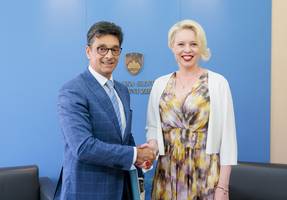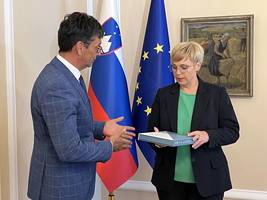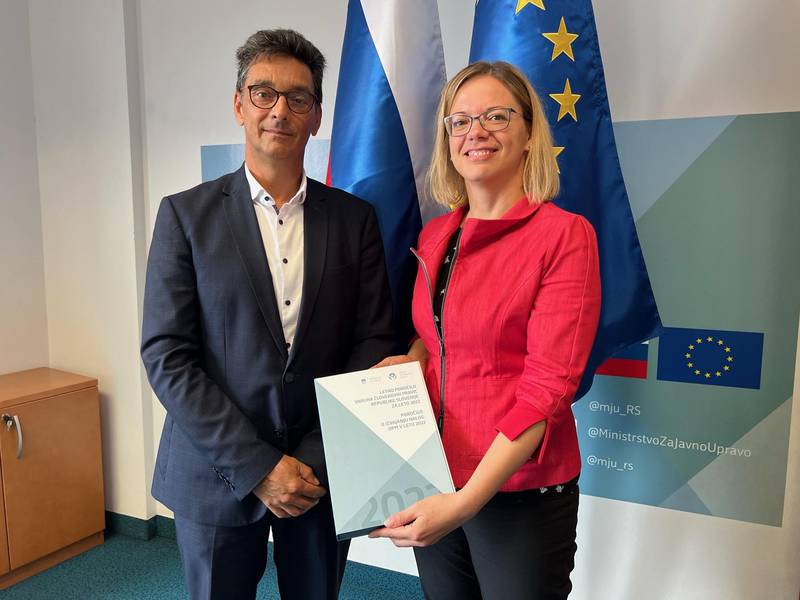On 19 June 2023, Human Rights Ombudsman Peter Svetina delivered the 28th Ombudsman’s Annual Report and the 15th Report of the National Preventive Mechanism to the President of the National Assembly of the Republic of Slovenia, Urška Klakočar Zupančič, MSc, and the President of the Republic of Slovenia, Dr Nataša Pirc Musar. The following day, the Annual Report was also turned over to the Prime Minister, Dr Robert Golob.
After two thirds of the term as the fifth Human Rights Ombudsman, Peter Svetina finds that as a society we are becoming increasingly intolerant and insensitive to others, which coincides with a fall in of living standards for the majority of inhabitants of Slovenia. “Not only history but also the current decisions of decision-makers show that in politics it is easy to criticise the decisions and warn about the human rights violations of others, but it takes a lot more courage and determination to realise the human rights of all the inhabitants without the authorities discriminating against them,” said the Ombudsman upon the delivery.
“Even during the pandemic I warned that we as a society must make sure that 'we leave no one behind', yet, unfortunately, it seems that this is exactly what is happening. In 2022, the number of discussed complaints and other matters was roughly the same as in the time prior to the pandemic but we notice that individuals are finding themselves in an increasingly dire position, from which they often find it difficult to climb since measures that could give hope are much too frequently insufficient or work too slowly or are not clear enough,” emphasised the Ombudsman.
In 2022, the institution of the Ombudsman dealt with 5,975 cases, which is 13 per cent less than during the pandemic when the number of matters received increased by a third compared to the period prior to the pandemic. “There was no longer intense encounters with various measures to protect lives and health, which greatly interfered with the way of life and rights and freedoms, but this year many medium-term and perhaps even long-term consequences of the pandemic became apparent,” explained the Ombudsman. The number and content of the matters received also laid bare the consequences of the war in Ukraine, that is in the increased social segregation and poverty due to higher prices, while the complaints received also revealed more fear. “One such case of fear was, for example, the rejection of settlement of people with mental health disorders which was supposed to be carried out within the project of deinstitutionalisation of residents of Dom na Krasu. In order for such and similar cases not to occur in society, the people responsible must always be aware of the importance of appropriate communication with all stakeholders,” clarified the Ombudsman, adding that he had recommended to the Ministry of Labour, Family, Social Affairs and Equal Opportunities to devote special attention to measures to encourage a respectful attitude towards the rights of people with disabilities and their dignity on a general level and especially in individual environments where the implementation of deinstitutionalisation projects is planned.
In 2022, the Ombudsman dealt with a total of 3,026 complaints and found 222 violations of human rights and fundamental freedoms or other irregularities. The principle of good governance is still the most frequently violated (in 66 cases), followed by cases of unjustified delay of procedures, violations of equality before the law, violation of the principle that Slovenia is a legal and social state, violation of the right to social security, and violation of the rights of people with disabilities. He also encountered eight violations of the right to protection of human personality and dignity, and the same number of violations of the right to health care. These 222 violations or irregularities are still most often detected by the Ombudsman in the departmental area of the Ministry of Labour, Family, Social Affairs and Equal Opportunities (in 47 cases), followed by violations and irregularities that occurred in the work of administrative units (in 22 cases), the Ministry of Health caused irregularities and violations in 19 cases, and in the activities of municipalities 16 cases were detected. In 2022, 10 violations related to the Environmental Inspectorate of the Republic of Slovenia, and the same number also related to centres for social work.
The Ombudsman also emphasised that the number and proportion of well-founded complaints among those resolved are not a true indicator of the state of human rights protection in Slovenia, as not all those whose rights are violated contact the institution. “It also happens that a single well-founded complaint in which we found a systemic irregularity can mean a violation of the rights of hundreds or even thousands of people. This is also why we open our own initiatives and broader issues; in the role of a national preventive mechanism we take care of the rights of people in places of deprivation of liberty – in 2022 alone we made 98 visits. 147 children were assigned an advocate in 2022; as a national institution for human rights we carry out analyses and implement programmes to raise awareness of the importance of human rights; we successfully gave out awards in the framework of the first public competition for diploma, master's, and doctoral theses in the field of human rights, and we discussed also 144 cases from the field of activity of the Centre for Human Rights,” also clarified Ombudsman Svetina.
Based on all its activities in 2022, the Ombudsman made a total of 83 new recommendations to those responsible. “This year we are making slightly fewer new recommendations than last year; however, in view of more than 100 unrealised and still relevant past recommendations of the Ombudsman, the competent authorities still have a lot of work to do in the future,” said the Ombudsman.
The Ombudsman warns that by disregarding the recommendations of the institution of the Ombudsman, by increasing violations of the principles of good governance, and also by placing office holders in the lowest salary classes, the authorities of the time display a stepmotherly attitude towards the institution of the Human Rights Ombudsman, the mandate of which is determined by the Constitution, and last but not least, the relationship with all supervisory institutions in the country, such as the Court of Auditors, Commission for the Prevention of Corruption, Commissioner for Access to Public Information, Advocate of the Principle of Equality, and others, deteriorates. For example, the decision of the Constitutional Court regarding the inconsistency of the Public Finance Act with the Constitution due to non-respect of the financial autonomy of four independent state institutions has still not been implemented, even though the deadline for its implementation expired at the end of December 2021. “Democratic societies need independent supervisory institutions for a well-functioning system of checks and balances, as the European Commission points out in its report on the state of the rule of law in the European Union for 2022. It is imperative that their suggestions and recommendations, as well as their financial independence and appropriate position, be taken into account. Only in this way do the authorities send a clear message that they sincerely work for the welfare of the people,” stresses Ombudsman Svetina.
“I would like our recommendations to be implemented more quickly, as in most cases they arise from specific violations and findings, and they demand changes to either the legal framework or the practice of the authorities as soon as possible,” underlined Ombudsman Svetina. With only a general reference to human rights and without the determination to take human rights and fundamental freedoms seriously in our daily work without exception, society will not achieve the progress we want and can create together, unless we cooperate and fight for it. Each of us also sincerely strives in our own field.
Summary of the work of the Human Rights Ombudsman of the Republic of Slovenia for 2022



